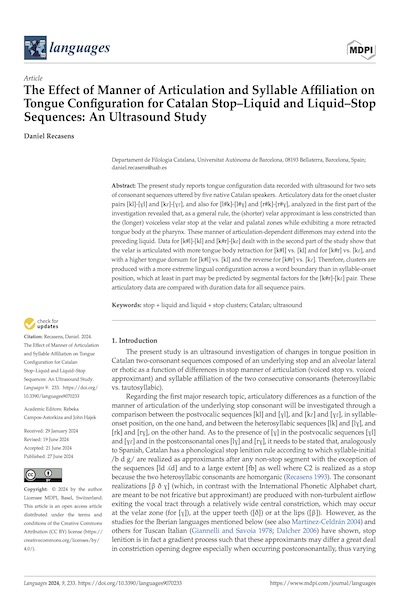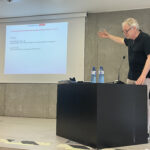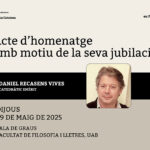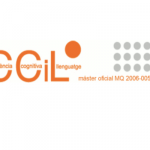29 desembre, 2022
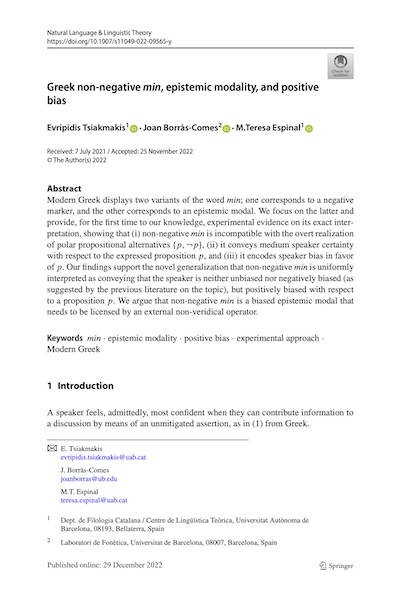
Autors:
Evripidis Tsiakmakis, Joan Borràs-Comes & M.Teresa Espinal
Títol:
Greek non-negative min, epistemic modality, and positive biasEditorial: Natural Language & Linguistic Theory (Springer)
Data de publicació: 29 de desembre del 2022
Text completModern Greek displays two variants of the word min; one corresponds to a negative marker, and the other corresponds to an epistemic modal. We focus on the latter and provide, for the first time to our knowledge, experimental evidence on its exact interpretation, showing that (i) non-negative min is incompatible with the overt realization of polar propositional alternatives {p,¬p}, (ii) it conveys medium speaker certainty with respect to the expressed proposition p, and (iii) it encodes speaker bias in favor of p. Our findings support the novel generalization that non-negative min is uniformly interpreted as conveying that the speaker is neither unbiased nor negatively biased (as suggested by the previous literature on the topic), but positively biased with respect to a proposition p. We argue that non-negative min is a biased epistemic modal that needs to be licensed by an external non-veridical operator.
31 desembre, 2022
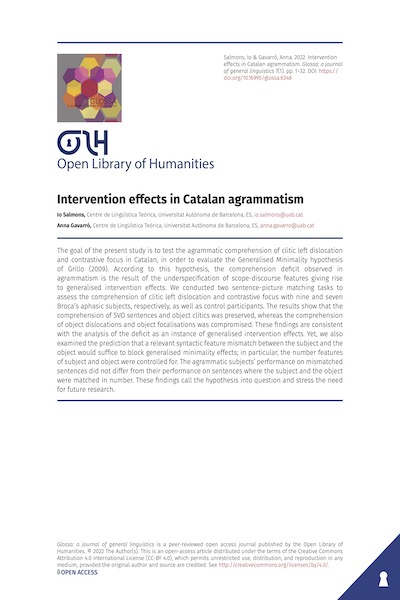
Autors:
Io Salmons & Anna Gavarró
Títol:
Intervention effects in Catalan agrammatismEditorial: Glossa: a journal of general linguistics (Open Library of Humanities)
Data de publicació: 31 de desembre del 2022
Text completThe goal of the present study is to test the agrammatic comprehension of clitic left dislocation and contrastive focus in Catalan, in order to evaluate the Generalised Minimality hypothesis of Grillo (2009). According to this hypothesis, the comprehension deficit observed in agrammatism is the result of the underspecification of scope-discourse features giving rise to generalised intervention effects. We conducted two sentence-picture matching tasks to assess the comprehension of clitic left dislocation and contrastive focus with nine and seven Broca’s aphasic subjects, respectively, as well as control participants. The results show that the comprehension of SVO sentences and object clitics was preserved, whereas the comprehension of object dislocations and object focalisations was compromised. These findings are consistent with the analysis of the deficit as an instance of generalised intervention effects. Yet, we also examined the prediction that a relevant syntactic feature mismatch between the subject and the object would suffice to block generalised minimality effects; in particular, the number features of subject and object were controlled for. The agrammatic subjects’ performance on mismatched sentences did not differ from their performance on sentences where the subject and the object were matched in number. These findings call the hypothesis into question and stress the need for future research.
27 febrer, 2023
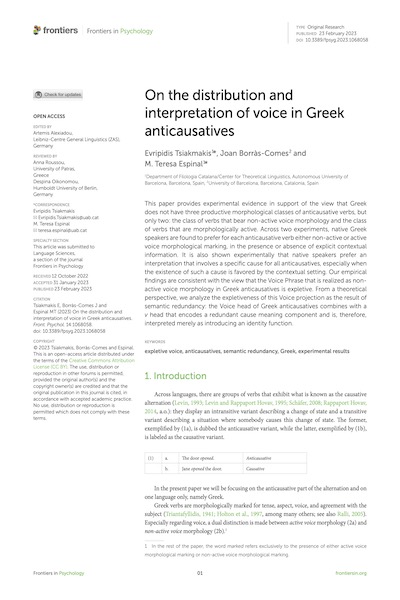
Autors:
Evripidis Tsiakmakis, Joan Borràs-Comes i M.Teresa Espinal
Títol:
On the distribution and interpretation of voice in Greek anticausatives. Frontiers in PsychologyEditorial: Frontiers
Data de publicació: 23 de febrer del 2023
Pàgines: 15 Text completThis paper provides experimental evidence in support of the view that Greek does not have three productive morphological classes of anticausative verbs, but only two: the class of verbs that bear non-active voice morphology and the class of verbs that are morphologically active. Across two experiments, native Greek speakers are found to prefer for each anticausative verb either non-active or active voice morphological marking, in the presence or absence of explicit contextual information. It is also shown experimentally that native speakers prefer an interpretation that involves a specific cause for all anticausatives, especially when the existence of such a cause is favored by the contextual setting. Our empirical findings are consistent with the view that the Voice Phrase that is realized as non-active voice morphology in Greek anticausatives is expletive. From a theoretical perspective, we analyze the expletiveness of this Voice projection as the result of semantic redundancy: the Voice head of Greek anticausatives combines with a v head that encodes a redundant cause meaning component and is, therefore, interpreted merely as introducing an identity function.
13 abril, 2023
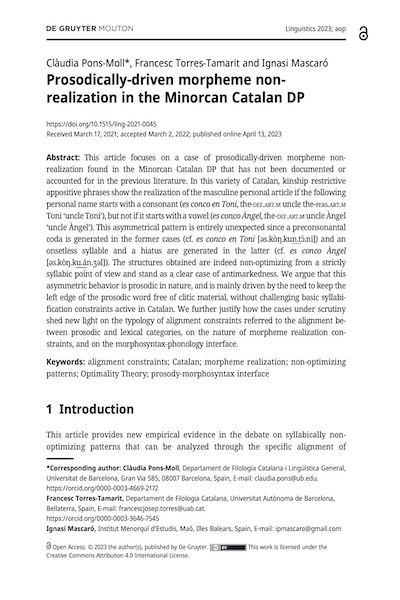
Autors:
Clàudia Pons-Moll, Francesc Torres-Tamarit i Ignasi Mascaró
Títol:
Prosodically-driven morpheme non-realization in the Minorcan Catalan DPEditorial: Linguistics, De Gruyter Mouton
Data de publicació: Abril del 2023
Més informació
Text completThis article focuses on a case of prosodically-driven morpheme non-realization found in the Minorcan Catalan DP that has not been documented or accounted for in the previous literature. In this variety of Catalan, kinship restrictive appositive phrases show the realization of the masculine personal article if the following personal name starts with a consonant (es conco en Toni, the-def.art.m uncle the-pers.art.m Toni ‘uncle Toni’), but not if it starts with a vowel (es conco Àngel, the-def.art.m uncle Àngel ‘uncle Àngel’). This asymmetrical pattern is entirely unexpected since a preconsonantal coda is generated in the former cases (cf. es conco en Toni [əs.kòŋ.kun.tɔ́.ni]) and an onsetless syllable and a hiatus are generated in the latter (cf. es conco Àngel [əs.kòŋ.ku.án.ʒəl]). The structures obtained are indeed non-optimizing from a strictly syllabic point of view and stand as a clear case of antimarkedness. We argue that this asymmetric behavior is prosodic in nature, and is mainly driven by the need to keep the left edge of the prosodic word free of clitic material, without challenging basic syllabification constraints active in Catalan. We further justify how the cases under scrutiny shed new light on the typology of alignment constraints referred to the alignment between prosodic and lexical categories, on the nature of morpheme realization constraints, and on the morphosyntax-phonology interface.
